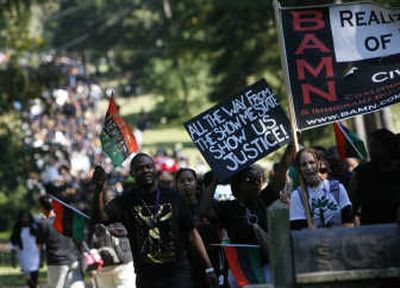Protesters flood town for ‘Jena 6’Thousands join rally after students charged

JENA, La. – Thousands of people from around the nation converged early Thursday on this rural town to protest what they consider the overzealous prosecution of six black high school students charged with beating a white schoolmate.
The impetus for the rally at this small town and at smaller vigils across the country was the anger demonstrators feel over the charges – that at one point included attempted murder and conspiracy to commit murder – leveled against the “Jena 6.” But, many participants said they also wanted to make a statement about what they believe is unequal treatment black people receive from the criminal justice system everywhere.
“There’s Jenas in Atlanta, there’s Jenas in New York, there’s Jenas in Florida and there are Jenas all over Texas,” the Rev. Al Sharpton told a raucous crowd Thursday morning.
As demonstrators poured into town in buses, cars and on foot there was also a sense of nostalgia for the huge civil rights marches of a generation ago and a hope that the response to the Jena controversy might rekindle the movement.
“It has been a long time since we had a march like this and people knew it was making history,” said the Rev. Kevin Domingue, 42, of Rockville, Md.
The outrage over the Jena 6 arose initially after the teenagers involved were charged with attempted murder. Moreover, critics complained, three white teenagers at the school who had hung three hangman’s nooses in a tree at the high school in August 2006 – the incident that began a spiral of events that culminated in the December altercation – were never prosecuted for committing a hate crime.
Since then, the charges against the black teenagers have been reduced to second-degree battery and conspiracy to commit battery, but many at the event Thursday said they believe such charges are still too harsh for what they characterize as a schoolyard fight.
“A potential penalty of 15 to 20 years is excessive for a schoolyard fight,” said Shannon Collins, 33, a petroleum engineer from Houston who grew up near Jena.
On Wednesday, LaSalle Parish District Attorney Reed Walters, who prosecuted the case, said it is inaccurate to portray the beating of the white student as a schoolyard fight. The victim, Justin Barker, was knocked unconscious, though he was treated at a hospital and released. Later that night he attended a class ring ceremony.
“The injury that was done to (Barker) and the serious threat to his survival has become less than a footnote,” Walters said during a news conference outside the parish courthouse with Barker standing alongside. “There was no schoolyard fight. To call it that creates sort of a boys-will-be boys image that is not correct.”
Police declined to estimate the size of the throng at the rally other than to say it numbered in the “tens of thousands.”
Still, the demonstration had echoes beyond Jena. Rallies were held in cities across the country in a show of solidarity including in Detroit, Atlanta and Philadelphia.
But the prime focus of the day was in the town of 3,500 people that suddenly found itself thrust into the national spotlight.
The buses began arriving hours before dawn, the travelers stepping out of the vehicles stiff, yawning and bleary-eyed. Most wore black T-shirts with a message “Stop the criminalization of our children” and “What is the color of justice?”
Through much of the morning, on Jena’s narrow streets and green spaces around the courthouse, it was virtually impossible to take a step without jostling someone else. Demonstrators formed a vast procession, about eight people across stretching more than a half mile – and that was just part of one crowd.
Most residents of the town, which is 85 percent white, remained indoors.
Those who sat outside to watch the procession said they felt frustrated by the protesters – some of whom were blasting Bob Marley from car stereos and carrying banners reading “Enough is Enough” and “Get to the Root of the Problem.”
“I actually heard a girl shout ‘Shame on Jena,’ ” said Pam Sharp, 43, a local resident who sat in her driveway as the marchers walked past her house. “I shouted back ‘No, shame on you!’ How can they include the whole town? That’s the shame.”
Many businesses such as the Burger Barn and the Brisket House were closed and had yellow police tape blocking people from parking there. Only a few whites were scattered among the vast assembly.
Jena’s white residents say that although there has been trouble in the town, the protesters are overlooking the fact that there are troublemakers on both sides of the racial divide.
Two white men, Gerald Tullos, 44, who works in the oil fields, and Ricky Coleman, 46, owner of Rick’s Pizza in town, turned out to watch the march. Both said they thought their town had been mischaracterized.
“In the beginning, the charges were too severe,” Tullos said.
“I approve of their standing up and making a statement about what they think is righteous,” Coleman said. “But they don’t know us. We really ain’t that way.”